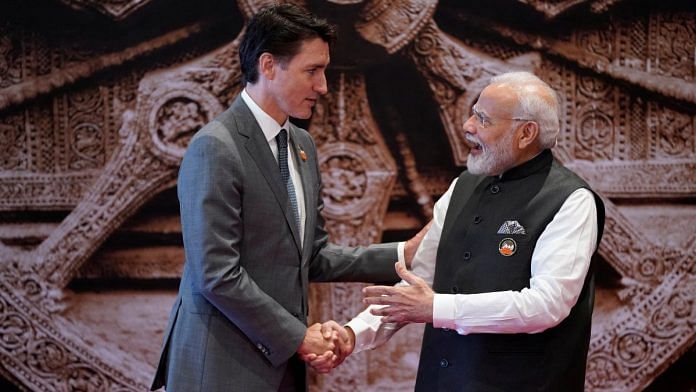This is a tale of two Prime Ministers spanning two decades. One was a seasoned politician, firmly grounded and in touch with real-world issues. The other, born into a political family, seemed to live in a world of make-believe.
On a chilly Diwali evening in 2003, Canadian Prime Minister Joseph Jacques Jean Chrétien visited Chandigarh. Although he was nearing the end of his term and was primarily on a visit to China, Chrétien, a long-time admirer of the Indian community—especially the Punjabis—had always yearned to visit Punjab and connect with its people directly. Recognising that this might be his last opportunity as prime minister, he included Chandigarh in his brief itinerary. This decision took many in India by surprise. A visit of this magnitude typically requires at least a year of preparation, and we weren’t fully prepared due to the Diwali holiday and limited availability of officials. Still, Chrétien was determined to visit both Amritsar and Chandigarh.
I was part of the opposition at the time, and the Punjab government was hosting the visiting PM. Surprisingly, the opposition was not invited to this event. However, Chrétien was not one to accept this norm. He was keen on meeting a diverse range of people, and when he realised the state government’s selective approach, he devised a unique solution. A reception was scheduled at Hotel Mountview in Chandigarh, and Chrétien made certain that members of the opposition, including myself, were invited to this banquet.
I hurriedly searched for a suitable gift for the visiting dignitary, something beyond the customary box of sweets. I wanted a memento that would resonate with the rich cultural heritage of Punjab. Eventually, I procured three books centred on Punjab, which seemed fitting for a leader of Chrétien’s stature, and quickly penned a heartfelt welcome message. Upon presenting the books to Chrétien, his delight was evident. He spoke warmly of the hardworking nature, ingenuity, resourcefulness, and tenacity of Punjabis in Canada. “I’ve always admired them and often wondered about the source of their drive to achieve such remarkable success in their newly adopted country across the oceans,” Chrétien remarked. “I wanted to keep my promise of visiting their homeland before my tenure ended,” he added. It was a modest gesture, but one that endeared him to all of us.
While Jean Chrétien’s gesture elevated relations between Canada and India, two decades later, in 2023, a single act by Justin Trudeau has seemingly upended a tradition and relationship that spans nearly a century.
Two decades on, this narrative resonates not just with Punjabis but has expanded to encompass a significant number of students and families spanning from Gujarat to Haryana, and from Himachal Pradesh to Tamil Nadu. Each of these households feels the profound sting of the deteriorating relations.
Also read: Canada must fix cosy approach to terrorism before accusing India. It’s terrible diplomacy
Canada must recognise the reality
Hearing Justin Trudeau level accusations against India in the Canadian Parliament, it felt as though I was listening to a discourse in Pakistan, where every governmental shortcoming is conveniently attributed to India, particularly to India’s external intelligence agency, the Research and Analysis Wing (RAW). Whether it’s an act of violence within Pakistan’s borders or a bomb blast, Pakistani authorities often resort to pointing accusatory fingers at India and RAW. This diversionary tactic serves to deflect attention from their own shortcomings. It seems that Trudeau may have taken inspiration from this approach, or perhaps even been influenced by it. What a standard to aspire to!
The situation would be surprising if it weren’t so perplexing. Justin Trudeau, in contrast to his esteemed father Pierre Trudeau, who also served as the Prime Minister of Canada, seems to inhabit a world of make-believe. Repeatedly, Indian authorities have highlighted anti-India activities originating from Canadian soil. The Kanishka bombing stands as a testament to the shortcomings of Canadian authorities, with justice remaining out of reach for the grieving families of the victims. However, the strategy of offering shelter while fostering potential threats, in the hope they might be leveraged against India, has proven to be a grave miscalculation.
For those voicing dissent against India from foreign lands while seeking refuge under the banner of freedom of speech, the message should be unambiguous. Honour your heritage, and act as representatives of India, instead of undermining the very land that nurtured you or your forebears.
For Khalistan sympathisers residing in Canada or elsewhere, the message is unequivocal: India has evolved. This is not the India of the 1980s and 1990s, grappling with insurgencies in the Northwest and Northeast or addressing separatist movements. Gone are the days when India pledged its gold reserves to alleviate financial constraints. Today’s India confidently claims its deserved position in the global landscape. It’s an India that, when necessary, opposes Western sanctions against Russia, stands firm against China at its borders, and assertively counters Pakistan, effectively sidelining it on the international stage.
In terms of financial and military prowess, India has surpassed Canada, championing the causes of the marginalised and empowering the disenfranchised—a role once played by nations like Canada. Figures like Justin Trudeau and certain elites in Canada, as well as in other Western nations that held significant power when India was newly independent, must recognise the shifting dynamics. The world has transformed, and so has India. This is a rejuvenated, robust, and assertive India that prioritises the safety and interests of its citizens.
It is time to recognise this undeniable reality.
Manpreet Badal is a former finance minister of Punjab. He tweets @MSBADAL. Views are personal.
(Edited by Prashant)



